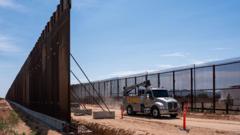This article explores China's formidable strategies against US tariffs in the ongoing trade war, including its ability to absorb economic pain, investment in technology, a shift in global trade partnerships, and its control over rare earth elements.
### The Trade War Playbook: China's Strategies Against US Tariffs

### The Trade War Playbook: China's Strategies Against US Tariffs
An analysis of China's countermeasures in the ongoing trade war with the US, highlighting its economic resilience and strategic resources.
China is currently engaged in a fierce trade war with the United States, facing tariffs of up to 245% on exports while retaliating with a 125% levy on American imports. As the world's second-largest economy, China possesses significant leverage to withstand the economic impacts of these tariffs, unlike smaller countries. With a massive domestic market, Chinese policymakers are exploring various incentives to boost consumer spending amid escalating tensions. While public opinion pressures exist, the government's authoritarian structure means it can prioritize long-term strategic goals over immediate grievances.
The trade war has pushed China to accelerate its technological advancements across numerous sectors, from renewable energy to artificial intelligence. With investments surpassing $1 trillion planned for innovation over the coming decade, Beijing is ramping up its competition in global markets, posing significant challenges to US companies. Efforts to diversify supply chains have faced challenges due to China's established infrastructure and skilled workforce that sustain its manufacturing superiority.
In response to earlier tariffs, Beijing has cultivated trade relations beyond the US, particularly with nations in Southeast Asia, Africa, and Latin America. This strategic pivot has helped to reduce dependency on American goods and solidify China’s position as the largest trading partner for numerous countries. By fostering domestic agricultural production and seeking imports from alternative suppliers, China has mitigated the impacts of American tariffs, thus displaying its strategic adaptability.
Moreover, the Chinese government wields significant influence over global markets through its control of rare earth minerals, essential for high-tech industries including electric vehicle production and semiconductor manufacturing. With approximately 61% of global rare earth production and 92% of refining capabilities, any attempts to restrict these exports could substantially disrupt American industries.
Interestingly, an economic analysis of the trade tensions also suggests that the US's economic policies are closely scrutinized by China. Past reactions by US markets to Trump's tariff strategies indicate a discernible connection through the bond market, where investors traditionally seek safety. As both nations navigate this complex economic landscape, it remains to be seen how sustainable these strategies will be in the long run.
In summary, China's approach to countering US tariffs showcases an array of economic tactics rooted in its strength as a major global player. With its technological investments, strategic partnerships, and control over key resources, Beijing is prepared to endure short-term challenges to safeguard its interests, suggesting that the trade war will be a prolonged ordeal.

















